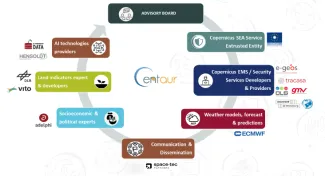CENTAUR successfully kicked off
Copernicus enhanced tools for anticipative response to climate change
We’re proud to announce the official kick off of CENTAUR, a new Horizon Europe project to develop and demonstrate new service components for the Copernicus Emergency Management Service (CEMS) and the Copernicus SEA – Copernicus in Support to EU External Action service in order to improve risk awareness and preparedness against the effects of climate change and security.
Our planet is under severe pressure due to the rising effects of climate change. We’re facing increased weather extremes ranging from heat waves over floods to storms and catastrophic landslides. The Copernicus Emergency Management Service (CEMS) and the Copernicus Service in Support to EU External Action support the European Union and its member states by provide mapping services and information for emergency response, disaster risk management and improving the situational awareness of European Commission, European External Action Service and Common Security and Defence Policy stakeholders. Within CENTAUR, a new Horizon Europe project led by e-geos, we will develop and demonstrate new service components to boost the current CEMS and anticipative response to climate change in the emergency and security domain.

To address climate change's effects on national security, a specific focus will be on urban flooding in CEMS and water & food insecurity in the Copernicus SEA operational Service Model. For SEA, CENTAUR will look at how we can improve reactive intelligence products with a new transversal strategy that considers climate change and its consequences on the environment and population, and integrate these products in proactive SEA systems and platforms that give a better understanding of current and future conditions. By improving these early warning capabilities on the impacts of climate change on the population we will be able to:
- improve policymaking and conflict prevention activities in areas under stress or at risk of conflict between communities sharing resources,
- prepare for impending water and food shortages
- anticipate population displacements
Addressing water and food insecurity
CENTAUR will enhance the current CEMS to better address the risks of flooding to urban populations, assets, and infrastructure, using EO data and a downscaled meteorological forecast at the city level. Predicting events, finding their extent, estimating damages, mitigating their effects, and ultimately increasing the efficacy of recovery action will all benefit from increased awareness efficiency and impact modeling.
Also, by defining and measuring indicators and crisis indexes that are sensitive to increased water/food insecurity and modeling subsequent risks of political instability, conflicts, and displacements risks in developing and fragile countries, the CENTAUR project aims to address water and food insecurity in the security domain.
The potential and limitations of long-term open data sources
Within CENTAUR, VITO will mainly focus on improving the SEA system with EO-based water and food security indicators, assessing the potential and limitations of the long-term open data sources and indicators, in terms of their spatial and temporal resolution, coverage, quality, applicability; and accessibility.
In order to compile data on vegetation health and water indices, VITO will draw on a variety of preexisting and active databases, mainly focused on but not limited to the Copernicus databases.


